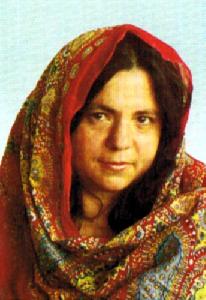My songs come from the wood, marshland, and the River Narva.
My first performances were quite hidden from the world — I walked in a wood where no one could hear me and sang. My mother did not think a lot of wood songs — she used to say that there was nothing but witchcraft in them!
She was even more critical about singers in her own home. „All of them,” she used to complain, „think only about one thing — how to get drunk and carouse till the morning. And for work they have no hands.”
It was a hint at my father who liked singing songs more than plowing the land. His companions came often to our house. They used to have a couple of drinks and then began to sing. They always started with „By the Mill”.
I discreetly sided with them, and they sometimes bestowed a small glass upon me. There was a sort of link between us. At the beginning I „visualised” all songs in settings around my house. When people began to sing „By the Mill,” I imagined that this song is about loves of my aunts, who had lived in our house and left a good memory among us. There was an old mill just behind our barn, on a hill. It belonged to the Kondraciuk family. From there you could see everything — our Dale and our Wood, the church and the graveyard in Łosinka.
There is also a ballad about the death of a warrior („There in the Wood Over the Dale”). My grandfather Stepan often told me about an „unfinished Swedish war.” A battle was fought in the old times near the village of Kutovaja, beside the Swedish graveyard. (For some reason our folks call all gravemounds „Swedish graveyards.”) War, my grandfather used to tell me, breaks out every year, but no one can predict when exactly. On such a night the souls of dead warriors wake up from their sleep. And, as in the old times, the knights begin to fight for their life. One can hear the blaring of trumpets, the whinnying of horses, the clanking of armour. On can hear cries of the winning side and moans of the wounded. The best view is on a moonlit night — one can see knights in golden armour dashing on horses. They fight until the first cock crows at dawn. All that can be seen close to our mill; sometimes those warriors fly back to this place and disappear in an old gravemound. It is near the mill.
Kutłôŭka has existed since time immemorial. There are gravemounds on the nearby hills. Here begins a large marshland, Kut (The Corner) and Dolina (The Dale), it stretches for some 20 kilometres and reaches the River Narva. The rivulet Kuljašeŭka, today a silted ditch, cuts the marshland across its middle. The village is on Dolina’s right side. Farther away, we have an old pine wood, Bôr, and an oak grove, Kostryno. The first written record about Kutłôŭka dates back to the 16th century and is about the crossing of our river by a stage-coach. At that time the village was beside an old road from Kraków through Narva to Vilnius.
The last settlers came here in 1864. Old documents describe them as wood settlers. I was born 101 years after this last settlement. I memorized the songs from my father and his companions as a child but learned how to sing them in my adult life, from women in forest villages.
The expression „Kateryna Has Been Sad” can make you insane (our Dolina has such an ill reputation). The phrase „to be sad” (žurycisie) in our language means not only „to be unhappy” but also „to reproach a little.” For half of my life I have been watching the dying of my village. I dream of a day when young people sing these songs anew.
I dedicate this recording to all singers of my childhood.














